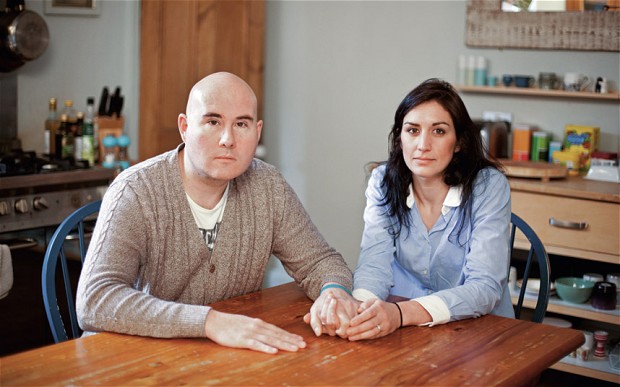|
Living with post-traumatic stress disorder: wives' and partners' stories

The wives and partners of servicemen with post-traumatic
stress disorder on how they live with the terrifying condition
I remember the first time I was woken by Simon crying out: this awful, blood-curdling scream. Suddenly he was back in the war zone with a gun in his hand and a woman in front of him, covered in blood. He squeezed my hand tightly and wouldn’t let go until morning. I recall thinking, ‘By day he’s my brave ex-soldier; but by night, who is this man?’”
Louisa Rodriguez, 30, met Simon Buckden, 41, two years ago, via their shared love of marathon running. At the time Buckden, who had served as a soldier in Bosnia, Northern Ireland and the First Gulf War, was undergoing cancer treatment.
“I knew Simon had post-traumatic stress disorder [PTSD],” says Louisa, “because when we met he was running marathons to fund charities helping PTSD outreach. When it came to our future together, it was the cancer that worried me most. I’d fallen for this kind, strong, compassionate man – a real inspiration in the way he lived his life for others. So it took months of sleepless nights and aggressive outbursts to realise what I’d taken on with Simon’s PTSD.”
PTSD’s symptoms range from nightmares and hallucinations to anxiety and inability to control emotions, and is often accompanied by alcoholism and substance abuse. According to American statistics, one in five veterans of the recent Iraq and Afghanistan wars suffers from PTSD. Here the Ministry of Defence (MoD) seems reluctant to accept the extent of the syndrome, with official MoD statistics citing PTSD prevalence among serving soldiers and vets at 2.9 per cent (lower than rates in the general British population).
The “invisible wounds” of combat-related PTSD affect not only the soldier or veteran, but also those around him or her. According to American and Israeli studies, veterans with PTSD are three times more likely to divorce than veteran counterparts not diagnosed with PTSD and are more likely to perpetrate physical and psychological aggression against their partners, with rates as high as 63 per cent for some forms of physical aggression in the past year.
|
Daily Telegraph, 07/04/2014
|
|
|
|
The Mary Initiative
A Bridge of Understanding
Operational, Safety, Security & First Aid Training for NGO's
|
|
|
|